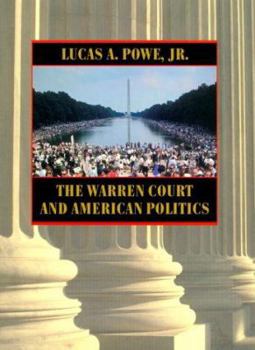The Warren Court and American Politics
Select Format
Select Condition 
Book Overview
The Supreme Court under Chief Justice Earl Warren was the most revolutionary and controversial Supreme Court in American history. But in what sense? Challenging the reigning consensus that the Warren... This description may be from another edition of this product.
Format:Hardcover
Language:English
ISBN:0674000951
ISBN13:9780674000957
Release Date:March 2000
Publisher:Belknap Press
Length:566 Pages
Weight:2.20 lbs.
Dimensions:1.4" x 6.7" x 9.6"
Customer Reviews
4 ratings
amazing
Published by Thriftbooks.com User , 16 years ago
This book is exceedingly interesting, and it was shipped much more quickly than I expected.
Superb history of the Warren Court
Published by Thriftbooks.com User , 19 years ago
"There was a time," Professor Powe states at the start of this excellent book, "when political scientists had as much interest in the [Supreme] Court as did academic lawyers and when the major journals of political science regularly published articles in this genre." He adds that this tradition has since passed, and with it a component of the Supreme Court essential to understanding its full impact upon events. If ever this was true of the Supreme Court, it was during the chief justiceship of Earl Warren. From the mid-1950s through the end of the 1960s, the Court handed down a number of decisions that fundamentally transformed not just American law, but life in the United States. Critics of these decisions reacted strongly, with this reaction shaping not just contemporary politics, but the subsequent judgments of the Court as well. As Powe demonstrates in this excellent book, any history of the Warren Court that omits the politics of the period this overlooks a critical component necessary for understanding both its development and its legacy. Powe begins his analysis by examining the history of the Court in the two decades prior to Warren's appointment. These were among the most important and tumultuous in the history of the institution, with a conservative-dominated Court's showdown with President Franklin Roosevelt fundamentally impacting the course of events in the 1930s. Powe's first major point is how Roosevelt's subsequent appointments shaped American jurisprudence. In effect, Justice Roberts' "switch in time" effectively changed the course of American law, as the Court increasingly abandoned the defense of economic rights that had characterized Court decisions since the Civil War and endorsed the federal government's power to regulate the economy. As Powe effectively demonstrates, this was the one point on which the fractious Roosevelt appointees on the divisive Court of the 1940s and early 1950s could agree, effectively laying the issue to rest. With the resolution of the issue of economic regulation, the Supreme Court increasingly found itself facing a new issue - the rights and liberties of the American people. This came in two forms: arguments over the government's power to curtail civil liberties, and the question of the civil rights of African Americans. This was the new challenge that Warren faced upon the Court, and early on he inaugurated a new phase in American history with his unanimous decision in the famous Brown v. Board of Education case. Powe ably summarizes the well-known struggles within the Court over this decision, as well as the vehement Southern reaction against it. The Brown decision inaugurated the first of three phases that Powe sees in the history of the Warren Court. The first, which Powe sees as covering the 1953-1956 terms, is a period of early advances in the fields of both civil rights and civil liberties. While the civil rights cases have received extensive coverage, the other controversial
A strong history of the Warren Court.
Published by Thriftbooks.com User , 19 years ago
Lucas Powe does a wonderful job of reintroducing a nearly forgotten genre of Court studies-examining the Court within the context of the political era. Too often modern scholars tend to study the Court as a self-contained entity without consideration of the political world surronding it. In about 500 pages (hardcover) Powe presents a thorough examination of the major achievments of the Warren Court era. He takes us through the early years and focuses on desegregation and domestic security, the two major issues of the '50s. But the truly juicy material comes up in the chapters covering the 1962-68, which is about half the book. In this section we see the incredible level of judicial creativity that the Warren Court employed in expanding the Constitution and applying it to areas such as reapportionment, freedom of speech, separation of church and state, and criminal procedure to name a few of the big ones. Powe presents a period of the Court's history that still is highly controversial today. Anyone interested in understanding modern constitutional history, and for that matter politics, should definitely read this volume. It will give the reader the context to understand the volitile debate over "judicial activism" because the Warren Court is still the very definition of an activist Court.
A Truly Good Book
Published by Thriftbooks.com User , 24 years ago
The dust jacket blurbs call the substance of this book, "definitive," "seminal," "the best in a generation," and "a tour de force." The prose is called, "elegant," "lively, at times riveting." They weren't kidding. The book is great.




